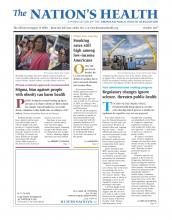Exposure to extreme heat may lead to problems with pregnancy and birth outcomes, a recent study finds.
According to the study, published in July in the International Journal of Environmental Research and Public Health, exposing pregnant women to extreme temperatures can lead to problems related to length of gestation and birthweight, neonatal stress and stillbirth.
Study researchers conducted a literature review of the effect on climate change on maternal, fetal and neonatal health. They found evidence of adverse outcomes across studies, with preterm birth being the most common.
Exceeding a heat threshold was found to be a bigger driver of adverse outcomes than duration of heat exposure. According to the study, “data show that surpassing historical temperature percentiles in each city resulted in an adverse birth outcome of some kind across all studies.”
Pregnant women need to be concerned about heat exposure, said study author Sabrina McCormick, PhD, associate professor of environmental and occupational health at the Milken Institute School of Public Health at the George Washington University.
“We often normalize the heat...but when it comes to pregnant women, it may be that we need to be more cautious than we have to date,” McCormick told The Nation’s Health. “(We need) to reconceptualize heat as another risk that pregnant women have to consider as they go about their day-to-day activities.”
Climate change has been linked to increasing temperatures around the globe, and 2016 was the warmest year ever recorded.
McCormick said she would like to see health care providers become more educated about extreme heat linked to climate change and communicate the dangers of extreme heat exposure with pregnant patients in regular conversations.
Environmental policy also has the potential to influence the health outcomes of pregnant women, particularly in terms of reducing the urban heat island effect, McCormick said. The urban heat island effect refers to metropolitan areas that are much warmer than surrounding rural areas due to human activity and the absence of green spaces.
“It’s extremely important that both policymakers and individual cities...attempt to reduce the urban heat island effect through increasing access to green space and green coverage in general,” she said.
Public health has an equally important role in communicating the importance of staying cool in high temperatures. McCormick noted that while heat advisories are often geared toward at-risk groups such as children and elderly people, pregnant women are rarely included in such messaging. She said she would like to see public health warnings about extreme heat specifically target pregnant women, who are also at high risk for heat-related illness.
In addition, because pregnancy is often a time for women to reconsider their health behaviors, being more environmentally conscious can also be part of making good prenatal health decisions, according to McCormick.
“When we think about the transgenerational effects of climate change — which there are and there will be more of — this kind of research shows how (what) we’re doing today will affect our children (and) our children’s children,” she said. “It’s an important reflection on why we need to be taking action.”
For more information, visit http://www.mdpi.com/1660-4601/14/8/853/htm.
- Copyright The Nation’s Health, American Public Health Association









